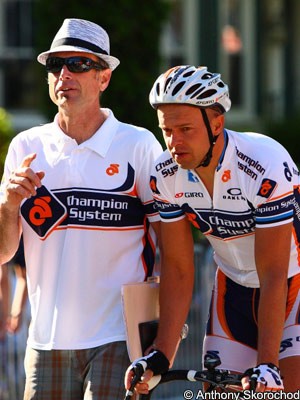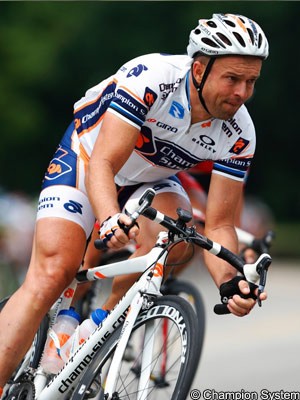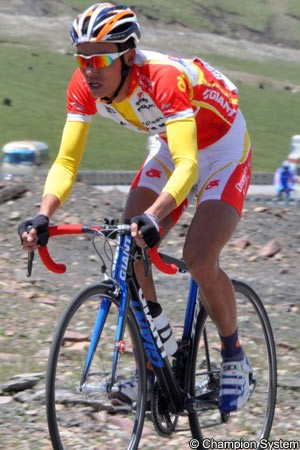Ambitious project with eventual goal of WorldTour status
Click here for part II of this interview
 Aiming in the short term to race successfully as Asia’s first Pro Continental setup, then longer-term to become a UCI ProTeam, the Champion System squad is preparing for what will be a very important season.
Aiming in the short term to race successfully as Asia’s first Pro Continental setup, then longer-term to become a UCI ProTeam, the Champion System squad is preparing for what will be a very important season.
The team has made some very solid signings in recent months and should get official confirmation in the next few days that it has the Pro Continental licence. Amongst those coming on board are former ProTeam riders Craig Lewis (HTC Highroad), Chris Butler (BMC Racing Team), Will Clarke (Leopard Trek), Aaron Kemps (formerly with Astana, more recently Fly V Racing) and past RadioShack stagiaire Clinton Avery.
Also involved is the former Ag2r La Mondiale and Crédit Agricole pro Jaan Kirsipuu, who blazed to four Tour de France stage wins during his career and continues to race at 42 years of age. He is moving across from the previous Champion System team, which general manger Ed Beamon stresses is quite a different setup to what is being put in place.
More recently, the team confirmed several big Asian signings including former Tour de Langkawi points jersey victor Anuar Manan and seven time continental BMX champion Steven Wong.
These signings plus a solid budget makes it clear that big plans are in place; the team will lobby to get into big events in 2012, then plans to be WorldTour level within four years. That would give it automatic entry to races such as the Tour de France, Giro d’Italia and Vuelta a España.
Beamon (pictured above with Kirsipuu) spoke to VeloNation recently about the project, detailing the background, talking about the funding, and laying out the overall goals.
“We’ve scripted out a five-year plan,” he said during a long interview. “To get to years three, four and five, we are going to need bigger funding, but the plan is about raising the level of competitive athlete in that part of the world. And so, with that as a mission, it’s a mandated long-term commitment. It’s just not something that can happen overnight.
“So, it’s not just about the marketing and the branding of Champion System; a big part of this project is really about creating opportunity and creating growth in the development of the competitive cycling in Asia.”
Beamon plans to have eighteen riders in all in 2012. Sixteen of those have already been announced, with two others yet to be confirmed. They will target races around the globe, with three – or possibly four – continents to be targeted.
“Obviously, it’s a Chinese registered team so we want to make an impact and a statement in Asia; the Asian calendar will be very important to us. That’s pretty heavy early-season, then you have Tour of Qinghai Lake in the middle of the season, and then it’s very heavy at the end of the season,” he said.
“As a result, we’ll certainly target all of the bigger Asian races and hopefully will be able to get a wild card invite to the Tour of Beijing. But we’ll also have a base in Europe and then, provided we get the invites, we’ll do a full season in Europe with at least part of the squad, and then also try to do a fair amount of racing here in the States.
“It’ll really be a three-dimensional approach, I guess, with racing in all three continents. In theory we may do some racing in New Zealand and Australia as well.”
In part I of this interview, Beamon explains much of the detail behind the project, the short and longer-term plans and how Asia could become a major force in world cycling.
VeloNation: First off, Ed, when was it that you started working with the team?
Ed Beamon: You know, they had the boys over here for about a month to do some racing in the States. I’ve known Charlie Issendorf, the VP of marketing here, since he was a junior, so we go way back. And then I met Louis Shih [company co-founder] a few years back when Champion System was sponsoring the Team Type 1 team. We’ve stayed in touch – he is a great guy.
This is a company that’s been so supportive of American cycling over the years. We just always stayed in touch, so when they wanted to bring a team over here they gave me a call and asked me if I’d take care of them.
Unfortunately, because of Pegasus [the Australian team that collapsed prior to the start of the 2011 season – ed.] I had nothing to do, so I did take care of them and it worked out great. It rekindled a conversation we had a few years ago about trying to build a little bit bigger programme that had at its core the mission to help develop Asian-based cyclists, to be a catalyst for developing the infrastructure and the organisation of the sport over there. So, all of this went down in June and July, and by the end of July we came to a consensus that we were going to jump into the cold water and get something going.
 VN: Obviously, there are some nice signings there, and guys like Jan Kirsupuu will continue. But how will next year’s team differ from this year’s team?
VN: Obviously, there are some nice signings there, and guys like Jan Kirsupuu will continue. But how will next year’s team differ from this year’s team?
EB: Well, for starters it’s a completely new organisation. The connection between the two teams is just a few of the riders. There are actually six guys on the team, two of them are from Hong-Kong, and the other four are from Europe, guys who were part of the Continental team. But other than that it’s pretty much a whole new structure.
If all goes well with the UCI, which it seems to be right now, then the team will be a second division team [Pro Continental – ed.] That’s obviously a big difference from a Continental team. The other difference is that we have more Asian-based riders on the team. So it’s a bigger commitment to the Asian development side.
VN: Obviously Champion System is the main sponsor. Will there other big sponsors, or will that bear most of the costs?
EB: At the moment Champion System is the title sponsor and they are the main funding for the team. We have a few other Chinese companies involved in a smaller way. They are all Chinese or Hong-Kong companies.
We had hoped that we’d be able to bring a bigger corporate on board, but again the whole project didn’t come together until July, so that didn’t give us a lot of time to work. One of the things that we found is that, especially in China right now, it’s very difficult to get the full value and the full message of what we are trying to do without actually having a product.
So, we kind of made a decision at one point…‘look, let’s just roll up our sleeves, get the team on the ground.’ Champion Systems is prepared to kind of float the nut, if you will, and once we have the team running then we can go back and concentrate on trying to bring some new partners on board that can help us grow to a much bigger level.
VN: Obviously, that’s great if that happens sooner rather than later, but have they committed to supporting it for a certain amount of time, regardless?
EB: Well, the whole idea here is basically that Louis Shih, who is the founder of the company, has had a dream for many years to have an impact on the development of cycling there in Hong-Kong, in China and in greater Asia.
So, we’ve scripted out a five-year plan. To get to years three, four and five, we are going to need bigger funding, but the plan is about raising the level of competitive athlete in that part of the world. And so, with that as a mission, it’s a mandated long-term commitment. It’s just not something that can happen overnight. So, it’s not just about the marketing and the branding of Champion System; a big part of this project is really about creating opportunity and creating growth in the development of the competitive cycling in Asia.
VN: You said that there’s going to be a very big Asian part of the squad. What proportion of races will you do there compared to elsewhere?
 EB: Right now we are planning an eighteen-rider roster, Of those eighteen guys, eight of them will be Asian. Obviously, it’s a Chinese registered team so we want to make an impact and a statement in Asia; the Asian calendar will be very important to us. That’s pretty heavy early-season, then you have Tour of Qinghai Lake in the middle of the season, and then it’s very heavy at the end of the season.
EB: Right now we are planning an eighteen-rider roster, Of those eighteen guys, eight of them will be Asian. Obviously, it’s a Chinese registered team so we want to make an impact and a statement in Asia; the Asian calendar will be very important to us. That’s pretty heavy early-season, then you have Tour of Qinghai Lake in the middle of the season, and then it’s very heavy at the end of the season.
As a result, we’ll certainly target all of the bigger Asian races and hopefully will be able to get a wild card invite to the Tour of Beijing. But we’ll also have a base in Europe and then, provided we get the invites, we’ll do a full season in Europe with at least part of the squad, and then also try to do a fair amount of racing here in the States.
It’ll really be a three-dimensional approach, I guess, with racing in all three continents. In theory we may do some racing in New Zealand and Australia as well, but there’s not that much racing going on there.
VN: Let’s look at the background for a moment. For people that don’t know, what is Champion System?
EB: Champion System is a technical clothing apparel manufacturer. They basically make custom cycling clothing. They do clothing for some other sports as well, but cycling and triathlon are the biggest market. They’ve got offices in over twenty countries worldwide right now. The company is only six years old but they started on a platform that they wanted to make affordable clothing. They started right away with a concept that they were going to make clothing that is at a very affordable price point.
In the six years, the quality of that clothing has just…it’s amazing how far it has come. The fabric and hardware are sourced from major vendors in Italy and fashion capitals and the construction is top quality. It’s the same stuff you’ll find on any top quality garment, but they’ve managed to keep the price point down…it’s a product that is really affordable for the masses. At the moment they don’t make a retail line, it’s strictly custom.
They’ve been really attuned to the value of the sponsorship and the importance of supporting the sport right from the beginning. Even from year one, they got involved with some pretty reasonably-sized sponsorships, with the Toyota United team. I think last year they actually sponsored six pro teams here in the States and several around the world. So, sponsorship has always been a big part of their marketing platform.
VN: You mentioned trying to get an invite to the Tour of Beijing and you also mentioned a five-year plan, so is the team looking at the WorldTour level at the end of five years or what is this vision for the future?
EB: Absolutely, yeah. I think there’s two levels of goal. One is to create a development platform and to raise the quality of…in particular, Hong-Kong, Chinese, the Pan-Chinese area, but also the greater Asian arena. We want to raise the quality of those riders and get them to the highest level, but at the same time we’d like to do that with the whole team as well.
The ultimate goal is to have a ProTour team…whatever that looks like in five year, who knows. But if it is World Tour or some other evolution, we want to be on the highest level of the sport. Obviously that is going to depend on funding, so in a five year plan we have actually targeted year four as a year when we’d like to see ourselves at the highest level. But ultimately that part of the sport comes down to budget, and so a big task for us will be to raise the fund to be able to do that.
But regardless, we want to produce athletes, we want to create a pathway for athletes to get to that level, especially from China and Asia. If we are not successful in getting the team to that level, at least we hope we can get some athletes to that level.
VN: The Tour of Beijing is presumably big news in China. The UCI has referred to this region as an untapped market, so is this race going to make the sponsor search easier and bring companies out of the woodwork?
EB: I think the sport is viable as a marking tool and it’s a huge market place. As the UCI has pointed out, and as most of the corporate world has pointed out, there’s a great economy going on in China right now. So, the funding is there.
I think the question is…will the sport be embraced? What you are finding right now in Hong-Kong and in mainland China is that you’ve got this middle class that’s evolved. Many of these people have really taken what was a transportation device and turned it into a recreation device.
So the recreational cycling community is growing there. As is the case with other parts of the world, a lot of these people that are involved there are involved in business and corporate life.
I think it’s not going to happen overnight and a unique aspect of the China arena is that business happens differently. It’s a different culture and there are different ways and expectations around doing business. Having a little bit of an understanding and learning how to work that environment is going to be an important part of how well we go, how well other teams may go, how well the UCI goes in terms of creating some traction there and building a sponsorship base over time.
But I absolutely think that a race like the Tour of Beijing [is important]… When you look at the growth of high-level races around the world, I don’t think anybody is even close to doing what China has done. In just a couple of years they’ve got a WorldTour event. They have I think, three hors-category events. They seem to get a big dot 1 tour every year, there’s another one or two popping up.
Last year the Tour of Lake Taihu was a dot two one day race and this year it’s a five day dot one race. I wouldn’t be surprised if next year it’s a hors-category race. So where other countries are struggling, where other parts of the world are struggling to find new bigger events, it’s happening in China. That’s a clear indication that there’s opportunity there.
In part II of this interview (available here), Beamon speaks about the race programme, the riders he has brought on board, how the team could be a catalyst to spur on the industry in Asia and more.